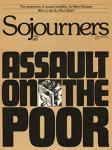"For decades people have lived with their fears. Whether those fears today are real or not, they still are fears. They are realities which we must understand, for you cannot heal a wound without knowing it."
Jim Zogby, past director of the Palestine Human Rights Campaign, shared these reflections near the end of the La Grange II conference held in May. The gathering was a sequel to a similar conference two years ago which issued the first La Grange Declaration (See Sojourners, July, 1979).
Evangelicals, Calvinists, Catholics, Mennonites, and mainline Protestants, as well as Palestinian Christians, joined with a scattering of Moslems and Jews to consider biblical foundations for justice and peace in the holy land.
Fr. Elias Chacour, the Palestinian Catholic priest interviewed in the October, 1980 issue of Sojourners, traveled from his home in Galilee to La Grange, Illinois, and told the Jews attending the conference, "I know how long you have been marginalized and persecuted. I have no words to describe it...I understand that you cannot risk friendship. You are a frightened people because of your sufferings. I feel a deep solidarity with you, for I too have suffered....You wanted your independence, self-determination, a home, and you were right....But this home that you wanted happened to be my home also."
Most of La Grange II was directed to how Christians should interpret the Bible and its themes of peoplehood, covenant, the land, and Jerusalem, in light of the Israeli-Palestinian conflict.
Vernon Grounds, a noted evangelical author, described how a pre-millennial and dispensational view of the Bible has been applied to give godly sanction to modern Israel. Though a pre-millennialist, Grounds critiqued that view's prevalent political stance, declaring, "It is impossible to confirm dogmatically that the contemporary happenings in Palestine fulfill prophecy....The Bible doesn't say who should live there. But it does say what all claimants should do--seek justice and mercy."
Who has the right to live where, and what constitutes justice, were hotly debated long past midnight one evening by two Palestinian mayors expelled from the occupied West Bank by Israeli authorities and Ms. Shula Koenig of New Outlook, a politically progressive publication in Israel. Earlier that same night, Rev. Joseph Lowery, president of the Southern Christian Leadership Conference, gave an impassioned call to justice in the Middle East. Fr. Bryan Hehir of the U.S. Catholic Conference added a dispassionate dissection of the critical issues involved.
John Howard Yoder, a Mennonite theologian, turned over new turf, however, in challenging the Western assumption that modern political statehood was the only, or the most desirable way to affirm a peoplehood and argued that the Old Testament "downgrades statehood as part of peoplehood."
"Statehood is the worst colonial export of the West," Yoder declared, regretting its impact on both Jew and Palestinian in the holy land. He wondered whether, as a start, it would be possible to "desacralize the claims of statehood."
Calvinist theologian Nick Wolterstorff agreed. In a thorough, captivating address, he traced the rise of the modern ideology of nationalism, and then its alliance with Zionism in creating the Jewish state of Israel.
Wolterstorff lamented that the problem is intensified further because of the Israeli insistence that there is no Palestinian "people"--only an Arab people--and therefore there are no legitimate "Palestinian" rights.
Exploring the covenant given by God to Abraham in Genesis, Wolterstorff asserted that even if it is relevant today, it only promises that the Jews shall be free to dwell in that land. That does not extend any biblical blessing to the contemporary Israeli state, he said.
Moreover, there are three central problems in believing that the promises to Abraham make God Israel's real estate agent today, claimed Wolterstorff. First, he demonstrated that exactly what land is promised is not at all clear in the various Genesis references. Second, he said, conditions were always attached to the promise, and those conditions were broken in the Old Testament. Wolterstorff asked whether anyone would argue that those conditions, such as not opposing the alien, are being fulfilled by the Jews living in modern Israel today. Third, Wolterstorff argued that in the letter to the Romans, Paul claims that the covenant is no longer tied to a particular nation or people but is inherited on the basis of faith.
"We must insist on the inalienable rights of all people to have land which is home--Jew and Palestinian," Wolterstorff concluded. The church's mission in the conflict is to "serve the cause of justice, lift oppression, and bring about a new human unity."
As the Middle East again threatens to erupt into widespread violence, the hope of La Grange II is that Christians may find the biblical foundations for a commitment to justice and the arduous task of peacemaking.
Wes Granberg-Michaelson, who served as Managing Editor for Sojourners, lived in Missoula, Montana, and was a part-time Associate for Global Resources and Environment for the Reformed Church in America when this article appeared.

Got something to say about what you're reading? We value your feedback!
